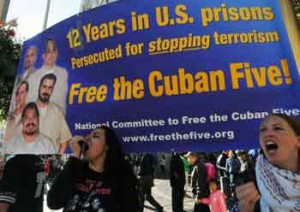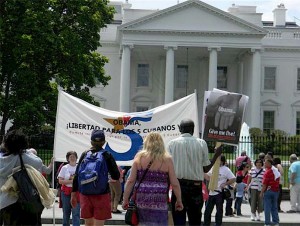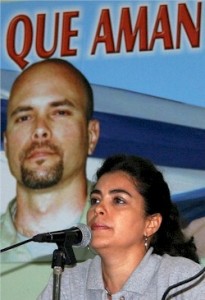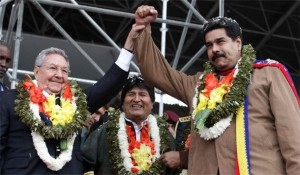Counterpunch
June 17, 2014
Terrorism As A Weapon Of Hegemony
The Cuban Five
by CHANDRA MUZAFFAR
Once again, the International Movement for a Just World (JUST) joins hands with the people of Cuba and justice-loving people in every nook and cranny of the planet, in demanding the immediate release of the three remaining prisoners from the Cuban Five who are still languishing in US jails, after 13 years.
Two were released after completing their prison terms — Rene Gonzales on the 7th of October 2011, and Fernando Gonzales on the 27th of February 2014. It is important to emphasize that they walked to freedom with their dignity intact. The three who are still in jail — Gerardo Hernandez, Antonio Guerrero and Ramon Labanino — deserve our fullest support and solidarity. We should continue to campaign for them with all our heart and soul.
To reiterate, the imprisonment of all five is a travesty of justice. The Cuban Five were monitoring Cuban exile groups in the US in the nineties who had a proven record of committing terrorist acts against the Cuban people. They were gathering information about the terrorist missions that these groups were planning and had informed the US authorities about what they (the Cuban Five) were doing. And yet they were arrested and jailed after an unfair and unjust trial.
If the Cuban Five working under the direction of the Cuban government was determined to expose terrorist activities being carried out against their motherland from US soil, it was mainly because Cuba and its leadership had been victims of US sponsored terror and violence for decades. In 1976, a Cuban commercial plane with 73 passengers on board, a number of them school children, was bombed, killing everyone. The alleged mastermind of this terrorist act, Luis Posada Carriles, is still alive, protected by the US government. There was also an unsuccessful invasion of Cuba by groups in the US in 1961, the infamous ‘Bay of Pigs’ fiasco. A series of terrorist attacks targeting hotels and tourists in the nineties sought to cripple the Cuban economy. And there have been innumerable attempts to assassinate the Leader of the Cuban Revolution, Fidel Castro, right through the 47 years that he was in power. Add to all this the crippling economic sanctions imposed upon Cuba by every US Administration since 1961 and we will get a complete picture of how a small nation of 11 million people has had to endure the terror unleashed against it by its superpower neighbor.
Why has Cuba been the target of terrorism in all its manifestations for so long? The reason is simple. The US elite will not accept in its neighborhood, a nation which is determined to choose its own path to the future without being dictated to, or dominated by, the US. It will not tolerate a people who are committed to defending their independence and sovereignty. To put it in another way, the US drive for hegemony does not permit another nation— especially a nation with a different worldview — to preserve and enhance its dignity.
This hegemonic attitude is borne out by the US’s treatment of other countries in Latin America. Whenever a nation steps out of line, the US line, it is clobbered. Sometimes through terror and violence. Look at Nicaragua, El Salvador, Panama, Uruguay, Ecuador, Bolivia, Brazil, Chile, at different times and in different circumstances. Even in West Asia, terror has been employed to both undermine governments which want to maintain a degree of independence from the US and the West and to create instability and chaos in society. This is the story of Somalia and Sudan, of Libya and Lebanon, of Iraq and Syria. In Southeast Asia too, the Vietnamese, the Cambodians and Laotians have all experienced US terror, just as the people of the Philippines had in the past. Weren’t the citizens of Hiroshima and Nagasaki also exposed to a US “rain of terror†in 1945?
Let’s be clear about this. Terrorism is a tool for dominance and control. Terrorism is a weapon of hegemony. The US — like some other states too—uses this weapon in both ways. It employs terror when it suits its interests. It also fights against terrorism when it serves its agenda. This is why for the US there are “good terrorists†and “bad terrorists.†It is quite happy to collude with the former and crush the latter.
This was obvious in Iraq following the Anglo-American occupation of the land in 2003. In the initial phase the occupier encouraged the Shia militias to fight the Sunni remnants of the Saddam Hussein regime. Once the Shias got into power through the democratic process and moved closer to Iran, the US became worried and backed Sunni militias fighting the Shia dominated government. Now of course, Sunni-Shia clashes, compounded by various other forces, have assumed a life of their own.
In Syria, it is an open secret that the US and other Western and regional actors have been actively involved in supporting the armed rebels against the Bashar al-Assad government in Damascus. Some of the rebels are favored more than others by the US just as other rebels are linked to some of the other external players. The good terrorists from the US perspective receive a lot of assistance including weapons and funds through channels connected to US allies in the region. Are there bad terrorists in the Syrian conflict? While the US may not approve of the tactics used by some of the rebels, it has refrained from strong denunciation of them since it shares their overriding objective of eliminating Assad. So it is Assad who is the bad terrorist in the eyes of the US. Assad is bad because he has been consistent in his opposition to US-Israeli hegemony over West Asia.
There is parallel of sorts to the Cuban situation. All those individuals and groups opposed to the Cuban government, however violent they may be, are good terrorists and have been bestowed with all kinds of aid by US agencies through various conduits. Fidel Castro, and his successor, Raul Castro, are the bad ones. Fidel in particular was demonized in the mainstream Western media as few other leaders had been. Needless to say, it was because of his principled position against US helmed hegemony, articulated with such depth and clarity, that a grossly negative image of the man was disseminated through the media.
But Fidel Castro and the Cuban Five have demonstrated that in the ultimate analysis truth will triumph. Today, Fidel commands a lot of respect and affection among ordinary men and women everywhere for what he has accomplished for his people and indeed for the people of Latin America and the Global South. Similarly, the cause of the Cuban Five has become one of the major rallying-points in the worldwide struggle for human freedom and human dignity because it symbolizes the struggle of the powerless against the powerful.
Dr. Chandra Muzaffar is President of the International Movement for a Just World (JUST), an NGO based in Kuala Lumpur, Malaysia.
















